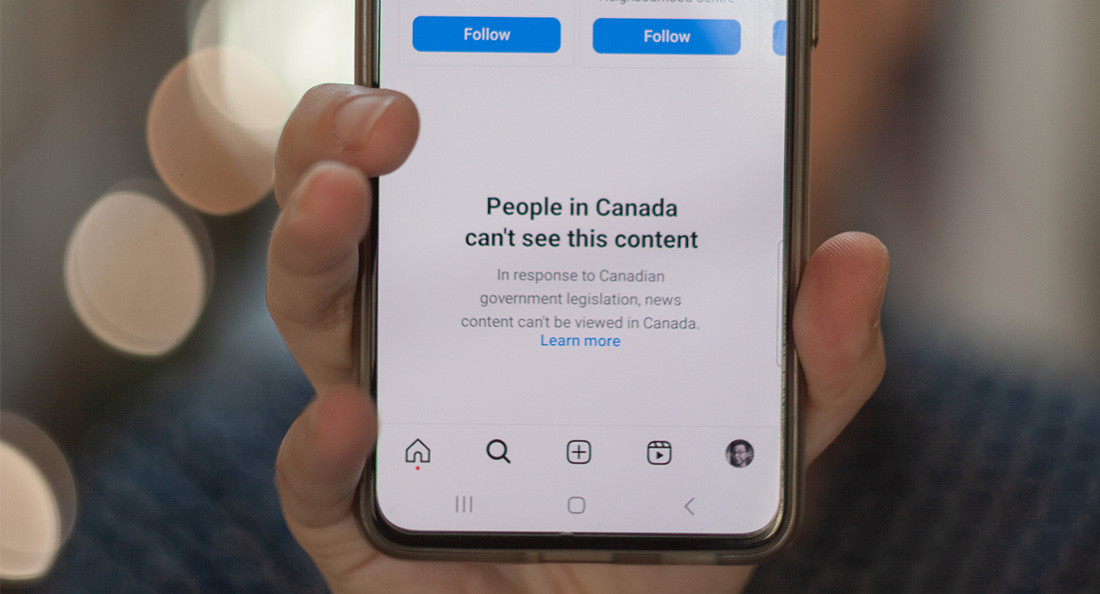Blocked Out
Social-media news shutout is a major barrier for readership
When users open Instagram on any device, search the name of any Canadian news organization and pull up the related account page, they’re met with a blank screen and the statement “People in Canada can’t see this content. In response to Canadian government legislation, news content can’t be viewed in Canada.”
Millions of Canadians rely on local news coverage for information about the weather, sports scores, traffic updates and student events. These networks and newspapers discuss and provide accountability for issues that national coverage often overlooks. Community and campus journalism help people access information about things that matter on a local level.
But on June 22, Meta, the parent company of Facebook, Instagram, Threads and WhatsApp, announced plans to remove access to this kind of information on its platforms in response to the Online News Act, which sets up a bargaining framework that requires online platforms like Meta and Google to compensate news organizations for use of their content. Canadians have since lost access to news organizations’ social-media pages across Meta’s platforms.
Denis Dorge, a student at Red River College Polytechnic, uses social media as his main source for news.
“I feel like, especially for the younger generation, nobody watches TV news. We all get it through social media,” Dorge says. “So if (Meta is) blocking the news through social media, how else are younger people going to stay informed?”
Dorge is not alone in relying on and trusting social media for news. According to an Ipsos study, Gen Z Canadians (68 per cent) were more trusting of information on social media than Millennials (55 per cent), Gen X (56 per cent) and Baby Boomers (45 per cent).
A Statista study found that, in 2021, Canadians spent an average of more than five hours with digital media each day.
With so many Canadians using social media as their main source for information, news organizations have been utilizing and, in some cases, working directly with tech platforms like Google and Meta to share their journalism with the public.

Gillian Brown is the editor-in-chief for The Manitoban student newspaper at the University of Manitoba.
Local impact
Student newspapers often rely on social media to connect with new readers on campus and engage with their existing audiences.
Gillian Brown is the editor-in-chief of The Manitoban, the student newspaper for the University of Manitoba. She says student papers play a special role on campuses in reaching the student body that’s rarely done elsewhere.
“At the U of M, there’s no journalism program, so student papers give students the opportunity to learn about journalism, to learn about how to write, to gain leadership experiences,” Brown says.
“I think that we’re a bridge between students because we’re students, and we’re communicating with students, and students are communicating with us.”
Brown says Meta’s block has caused The Manitoban to lose its most popular ways to share stories, get engagement and generate awareness of its print versions.
“We can post, but readers can’t access our stuff on Facebook and Instagram, and you can’t share links, either,” Brown says. She mentions that the paper is hiring a copy editor, but she can’t share a link to the job posting, even on her personal social-media accounts.
Marshal Hodgins, editor-in-chief for RRC Polytech’s student newspaper, The Projector, says past teams used to post content on Twitter (now X) and the paper’s website, but their biggest draw was Instagram.
He says the Projector team is trying to find new ways to connect with readers. This includes sharing content on TikTok and eventually launching an app that’s in development.
Hodgins says it’s going to be a challenging publishing year, because The Projector doesn’t have a large audience outside of Instagram.
“I’m hopeful that we can take our readership and connect with them elsewhere and still have them be engaged. But it’s hard to say what that’s gonna look like,” he says.
Papers and politics

Brent Jolly is the president of the Canadian Association of Journalists. Supplied photo
Meta’s decision to block news content on its platforms can be traced back to the Online News Act, previously known as Bill C-18. First read in Parliament on April 5, 2023, the act is significantly influenced by the Australian government legislation called the News Media Bargaining Code. The act received royal assent on June 22 and will come into effect on Dec. 19.
The Online News Act’s main purpose is to ensure that news companies are fairly compensated for use of their content by tech platforms such as Google and Meta, according to a statement from the Canadian government.
According to the Local News Research Project, between 2008 and June 1, 2023, 474 local news operations closed in 335 communities across Canada. In Manitoba alone, 30 news organizations have shuttered since 2008.

The Manitoban published a large QR code on its front page to direct readers to their website as a measure to counteract Meta’s blackout of Canadian news.
Brent Jolly, president of the Canadian Association of Journalists (CAJ), says Canadian news organizations are in a precarious financial state, with Meta and Google increasingly attracting more advertising revenue that would’ve gone to news organizations.
“This legislation is an opportunity to reset that relationship or at least rebalance it in a way that would allow news organizations to negotiate collectively for a much more fair deal with tech platforms than the one-off or asymmetrical arrangements that they’ve been seeking or signing and agreeing with news organizations for the better part of the last decade and a half,” he says.
Jolly says the fact that Meta has placed clauses in existing agreements so they can end the contract if any governments pass laws that regulate Meta, shows that they have thought about this before and feel threatened by any form of regulation.
“Why do we invest so much belief in, so much trust and so much time into these organizations and their products if they might not necessarily have the best interests of our society at
heart?” Jolly says.

Paul Samyn is the editor for the Winnipeg Free Press. Supplied photo
Paul Samyn, editor for the Winnipeg Free Press, bristles at the suggestion that Facebook hasn’t benefited from newspapers in the same way that newspapers have benefited from Facebook.
“A lot of people, it kills me when people say this, but they will argue that they get their news from Facebook. Facebook doesn’t create news. It doesn’t have any reporters, and it doesn’t have a single newsroom, but it’s a place where those who create news have stories available,” he says.
Facebook has faced criticism and concern over the platform’s content and pervasive “fake news,” and Samyn says having trusted journalistic organizations like the Free Press posting helps Meta.
“A key thing here is anytime anyone goes onto Facebook, their data goes with them. That data informs Facebook and allows it to make decisions about content that advertisers can use.”
Samyn says if Google follows through on its threat to remove news from its search, there could be a situation where two of the largest social-media and tech platforms would prevent Canadians from accessing news.
“From any credible news organization, that just doesn’t hurt the Free Press. It hurts everyone, and, in doing so, I think undermines what a modern society needs to be informed on what’s happening.”

Shannon Sampert is a part-time professor at the University of Manitoba and a Winnipeg Free Press columnist. Supplied photo
Caught in the crossfire
Shannon Sampert, part-time professor at the University of Manitoba and Winnipeg Free Press columnist, says Meta’s actions disrupt democracy, even at the university level.
“You have to remember that universities (and) student unions have remarkably large budgets and are responsible for the governance of remarkably large numbers of students,” Sampert says. “There’s also election campaigns that are coming up for student unions that you expect student newspapers to cover ... in a way that would allow the students’ information.”
She says Meta blocking news may impact voter turnout in the upcoming Manitoba general election.
“When you look at the lack of news availability in certain spots, you’ll also see there’s a corresponding lower electoral turnout,” Sampert says. “So it’ll be interesting to see, with the lack of news coverage available on Facebook, whether or not we’re going to see an even lower voter turnout in the next Manitoba election.”
Brown says the Online News Act has no consideration for student news organizations. “As students, I feel like we’re left out of the conversation a lot, and that’s something that we kind of saw with the bill. We’re not part of the bill, but we’re still being treated as if we are.”
The Canadian University Press (CUP) represents student journalism on a national level. Andrew Mrozowski, the organization’s president, says most CUP member papers prioritize posting things online to websites and social media, rather than printing. He says because social media has been the easiest way to connect with students, it’s going to be an uphill battle to try to figure out equally successful alternatives.
“It’s extremely important to note that under the current wording of Bill C-18, student journalists and student journalism are not captured under the legislation. Yet we are blocked by Meta,” Mrozowski says in an email to The Uniter.
“We are caught in the crossfire, a fight between tech giants and the government.”
With the uncertainty of what the Canadian news landscape holds for The Manitoban and other organizations, Brown sees print newspapers as more important than ever before.
“We’re relying really heavily on print right now, and there’s been some discussions behind the scenes and among student papers generally about a move to online only the past few years. I know a lot of student papers have moved totally online, and I’m really hoping to make sure that that does not happen” at The Manitoban, Brown says.
“We’ve been around for 110 years. We’ve been through world wars and the Great Depression and the pandemic, and we’re still here. Students need us, and as long as students need us, we’ll be here.”

Marshal Hodgins, editor-in-chief of The Projector
Published in Volume 78, Number 01 of The Uniter (September 7, 2023)







